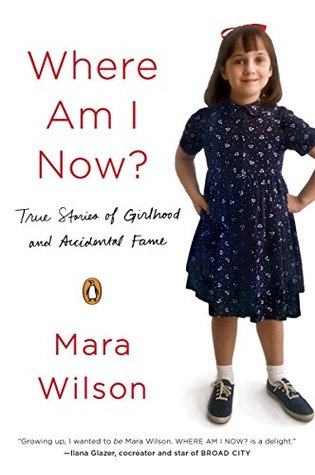More on this book
Community
Kindle Notes & Highlights
by
Mara Wilson
Read between
June 3 - June 7, 2018
If there’s been a narrative theme in my life, it has been a need to find a narrative in everything.
Kelsey L. Munger liked this
My friends aren’t sure what to say when I suddenly want to discuss the implications of an eternal afterlife—especially not the ones who are trying out for cheerleading.
Kelsey L. Munger liked this
Back when I was twenty, one of my professors picked up on my grandiose anxieties. “When you’re young,” he said, “you spend time thinking about the world ending and catastrophes. But by the time you’re my age, you’ll just spend time thinking, ‘I wonder what’s new at Pottery Barn.’”
Kelsey L. Munger liked this
No one had called me cute or mentioned the way I looked in years, at least not in a positive way. My sixth-grade crush had called me ugly, film reviewers said I was “odd-looking,” and a boy at my preteen day camp had said to me, “You were Matilda? Heh. You’ve gained a little weight since then!” I went home and cried into a Dairy Queen Blizzard.
Fighting with anxiety makes it worse; instead, accept the anxiety, and it will become less scary. Take a moment to breathe and take stock of your surroundings. Remember what’s real. Say, “This sucks, but it will pass.”
The ones who scared me, who still scare me, are the girls who see all other girls as competition, who see themselves as the persecuted ones, the ones whom the pretty and popular girls hate. When you believe you’re persecuted, you will believe anything you do is justified.
Anyone who doesn’t think fiction is as revealing as nonfiction is wrong: it’s more revealing, because the revelation is done unintentionally.
Kelsey L. Munger liked this
Luke had done the thing I found most attractive in a man: been willing to embarrass himself. This, I’ve learned, is a problem, as never actually feeling embarrassed is also a symptom of psychopathy.
In books and movies there’s always someone moaning, “I’m in love with him, but he doesn’t even know I exist!” They’ve got it all wrong, though: it’s not that the object of affection doesn’t know you exist, it’s that they don’t care, which is much worse.
There’s a reason actors are told to “use it” when they’re upset. You don’t go on with the show in spite of your heartbreak or grief. You go on because you’re grieving. It’s how you deal.
I don’t know if I’d consider myself an artist, but speaking as someone who sometimes makes stuff, I can say that my best work is created when I’m content and contemplative, looking back on painful times rather than in the middle of them.
Kelsey L. Munger liked this
In Los Angeles, I had felt judged. In New York, I felt ignored. Sometimes that was what I wanted: to disappear. But sometimes I wanted to be cared for, to belong, and I had to find that myself, because the city would not provide it on its own. New York had once had a reputation for “chewing you up and spitting you out.” It doesn’t do that anymore. Now it just swallows you.
Kelsey L. Munger liked this


